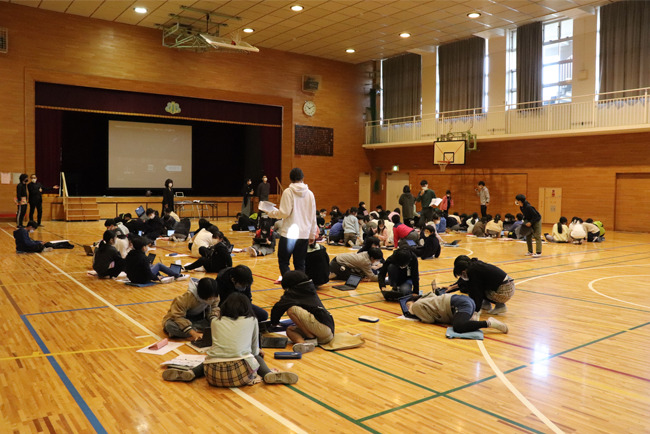In recent years, data science-related undergraduate departments have been established one after another.The government's "AI strategy" sets the goal of having all university and technical college students acquire basic-level knowledge by 2025, and that half of them, 25, will be proficient at the applied level. It is said that they will grow into experts who can play an active role in the world.From a global perspective, it is clear that highly skilled personnel in this field will become indispensable.

The "Information Education Research Institute" at Edogawa University not only nurtures the qualities and abilities of its own students, but also cooperates with various ministries and agencies, the Private University Information Education Association (hereinafter referred to as "Private Information Education Association"), various academic societies, and the board of education. We conduct research and activities with the goal of cultivating students with bachelor-level information literacy, logical thinking, problem-solving skills, and ethical attitudes.
At present, in elementary and secondary education such as elementary school, junior high school, and high school, the environment for information education is being improved by revising the course of study. Each university had its own information education based on its circumstances.It is an urgent issue to sort out the role of information education at universities and to prepare the path and environment for producing the target advanced AI human resources.
Since 2013, the Information Education Research Institute has been involved in the development of the "Guidelines for Information Literacy Education" by the Private Information Association, designing curricula, classes, and teaching materials according to the qualities and abilities that should be cultivated. We have also proposed a “problem-solving warp-weft model” to enable accurate evaluation ofThis serves as a guideline for instructors and encourages metacognition for learners.
Professor Kazue Tamada, Professor of the Department of Information and Culture, Faculty of Media and Communication, Edogawa University, and Director of the Institute of Information Education, Edogawa University,
“The current goal of information education is ``the ability to find the best solution to a problem that has no answer,'' and I think there is a knack for that. Our role as teachers is to teach.
To that end, it is important to acquire a "viewpoint and way of thinking" as a clue to grasping the problem and come up with a solution method, and to grasp general problem-solving tips rather than dealing with individual problems.If you try to solve it with knowledge alone, you will not be able to solve what you do not remember. If we can make analogies and generalizations by putting up barriers of "viewpoints and ways of thinking," we may be able to lead to solutions to unknown problems that are not widely known by deductive thinking. One of our research themes is to teach in a systematic way.In the future, we plan to proceed with the development of a curriculum based on the 'warp and weft model of problem-solving', which will make it easier for learners to realize their learning outcomes."
In addition, in December 2022, in collaboration with the Kyoto City Arts and Culture Association (Traditional Performing Arts Archive & Research Office), in order to spread Japanese classical performing arts to children and students, we will use ICT terminals to create shamisen music. Using teaching materials that fuse programming with programming, we also held practical classes at elementary schools.Many of the elementary school students who participated in the event commented that they felt a sense of closeness to the classical performing arts.

In addition to developing new programs using ICT as described above, the Information Education Research Institute is also focusing on teacher training and cooperation with elementary and secondary education.In addition to bottom-up information education through seminars and training, and by creating and utilizing highly versatile teaching materials, we are working on the problem of reducing the burden on instructors, improving efficiency, and correcting disparities between universities.
Professor Tamada talks about the importance of training leaders.
“Towards the Society 5.0 era, it is very important to acquire data science and programming skills, but more than that, we teachers must teach students how to coexist with AI. No. As the word “filter bubble” suggests, we are unknowingly surrounded by information from the Internet and trapped in a narrower world.
In one training session, a professor said that he thought that the reason why the search results for his research field came up on the internet was because people around the world were interested in his research field. bottom.There are still teachers like that, so it's no use thinking that the world that children know on the internet is the flow of the world, especially if they are in their childhood.
Therefore, the mechanism behind how the result comes out is that the program is running and there is an AI command, and searching on the Internet is that all your behavior is collected. Secondly, it is important to understand that we are living in an era in which information once spread cannot be erased.I want children to be taught from elementary and junior high school, before they are exposed to the information society, before the things they post on SNS after they reach high school age become like, "Wait, can't they be deleted?"That is why the training of leaders is so urgent. ”

Since 1990, when information technology began to advance, the Information Education Research Institute of Edogawa University has focused on research into information education.As a pioneer in this field, we will continue to develop human resources who can use ICT to solve social issues, including the new use of ICT. We will conduct research and activities in cooperation with various fields.

